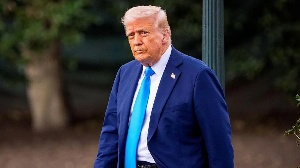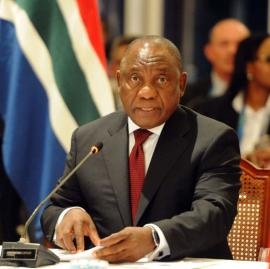- Home - News
- Elections 2024
- News Archive
- Crime & Punishment
- Politics
- Regional
- Editorial
- Health
- Ghanaians Abroad
- Tabloid
- Africa
- Religion
- Photo Archives
- Press Release
General News of Wednesday, 2 April 2025
Source: www.ghanawebbers.com
Trump is pressing the nuclear option on tariffs
Donald Trump has often talked about imposing large tariffs on imports. Many believe these tariffs will be delayed or reduced.
Today, he will speak in the White House Rose Garden. He aims to show his commitment to what he calls "the most beautiful word in the dictionary." This move could mark an end to decades of economic globalization.
Trump may propose a universal tariff on all imports into the U.S. A 20% tariff is seen as a way to generate significant revenue. Some advisers claim this could bring in trillions of dollars.
Recently, Trump stated that tariffs would be "reciprocal." He mentioned that the U.S. would be "nicer" to its trade partners. However, this does not exclude imposing tariffs of 10% or 20%.
If the U.S. views Value Added Taxes as tariffs, it could lead to broader tariff categories. As one G7 negotiator noted, "it all comes down to President Trump."
Such a system could shrink the UK economy by 1%. This decline might eliminate growth and prompt tax increases or spending cuts. An Aston University Business School study estimates global costs at $1.4 trillion (£1.1tn) due to trade diversion and rising prices.
In industry circles, there are expectations that the EU will target U.S. tech companies. The UK might choose not to retaliate but instead offer tax cuts for U.S. big tech firms.
Trade wars are difficult to win and can harm everyone involved. A universal tariff of 20% would significantly impact global trade, similar to the Smoot-Hawley tariffs from nearly a century ago.
There is a larger issue at play here. Vice President JD Vance recently stated that globalization has failed according to this administration's view. They believed rich countries would advance while poorer nations produced simpler goods.
Since this hasn't happened—especially with China—the U.S. is shifting away from globalization strategies.
If the U.S. alienates its allies today, China stands ready to benefit. For instance, losses for U.S businesses in Europe could lead to cheaper products from Asia entering the UK market.
Today's developments aim not only to reshape America and its trade policies but also how global affairs are managed moving forward.
Entertainment










